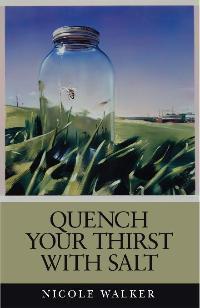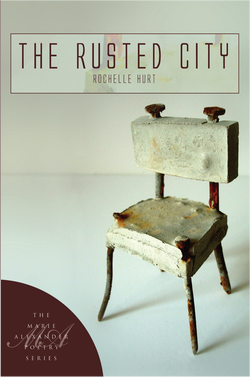
At heart, Nicole Walker is a poet. I knew this as soon as I read five pages of her memoir, Quench Your Thirst With Salt. I knew this way before I read her bio note and discovered that yes, Walker, had many poetry publications. I knew this as soon as this first paragraph popped out at me: "The fish jumped a ladder built of electricity and concrete. Swimming up the Columbia teaches her a lesson about progress. Even before the dam, the waterfalls would have battered her forefathers. The rocks would have walloped a punch, broken the skin, bruised the flesh."
And so starts Walker's Quench Your Thirst With Salt, a memoir. More specifically, however, this book is a collection of lyrical essays that explore her life growing up in the state of Utah. Every chapter can be read (and perhaps, should be read) as an individual essay. For instance, one chapter titled "Filtered Water" focuses on the life of the water we use while juxtaposing this life with the author's own life, describing what she knows and doesn't know about her own family history. In another chapter, she introduces the reader to her father's alcoholism through discussions of the term "superfluidity" and in another chapter she describes her relationship with her own body when she has to have surgery at a young age. While most of the book focuses on her life in Utah, other chapters venture outside of the state including Nevada, Oregon and Minnesota, all the while aspects of the natural world with her own life.
Readers will find that Walker's book is more of an episodic exploration of her life rather than a straight linear narrative. We don't necessarily find clear beginnings or clear endings; instead, we read thoughtful insights about family relationships and their correlations to the world around us. And, of course, it's easy to get lost (blissfully, so) in the poetic language of Walker's landscapes, whether they are manmade or natural.
You can read more about Quench Your Thirst With Salt on Nicole Walker's homepage or the website of Zone Three Press.
And so starts Walker's Quench Your Thirst With Salt, a memoir. More specifically, however, this book is a collection of lyrical essays that explore her life growing up in the state of Utah. Every chapter can be read (and perhaps, should be read) as an individual essay. For instance, one chapter titled "Filtered Water" focuses on the life of the water we use while juxtaposing this life with the author's own life, describing what she knows and doesn't know about her own family history. In another chapter, she introduces the reader to her father's alcoholism through discussions of the term "superfluidity" and in another chapter she describes her relationship with her own body when she has to have surgery at a young age. While most of the book focuses on her life in Utah, other chapters venture outside of the state including Nevada, Oregon and Minnesota, all the while aspects of the natural world with her own life.
Readers will find that Walker's book is more of an episodic exploration of her life rather than a straight linear narrative. We don't necessarily find clear beginnings or clear endings; instead, we read thoughtful insights about family relationships and their correlations to the world around us. And, of course, it's easy to get lost (blissfully, so) in the poetic language of Walker's landscapes, whether they are manmade or natural.
You can read more about Quench Your Thirst With Salt on Nicole Walker's homepage or the website of Zone Three Press.

 RSS Feed
RSS Feed
